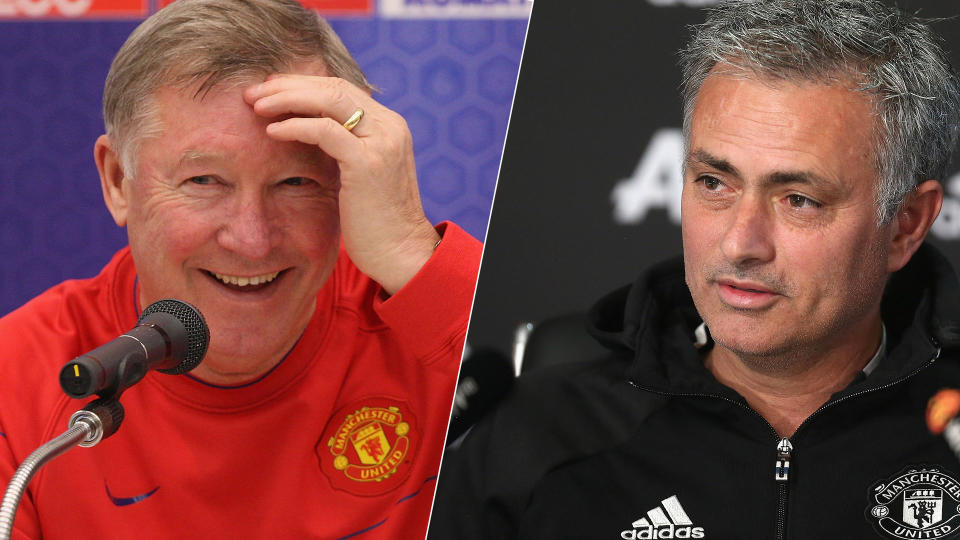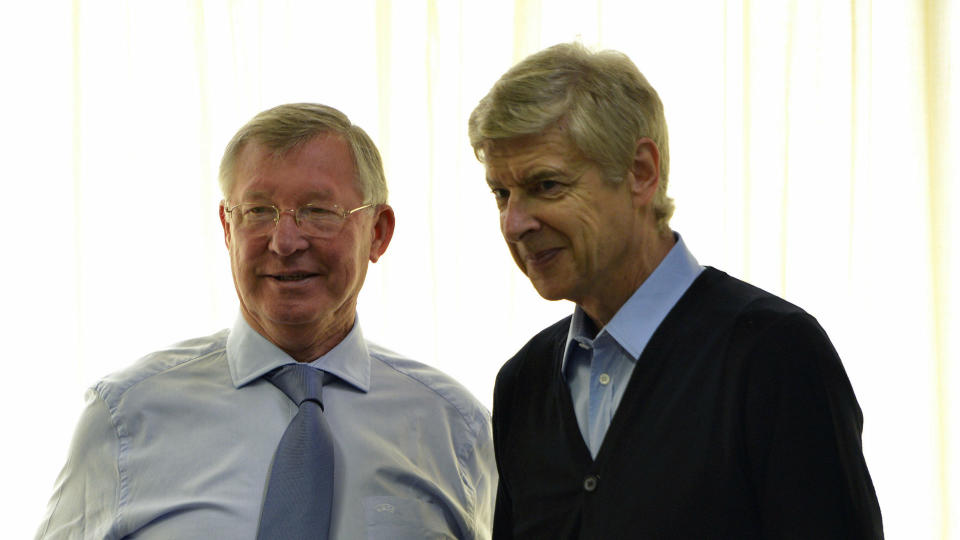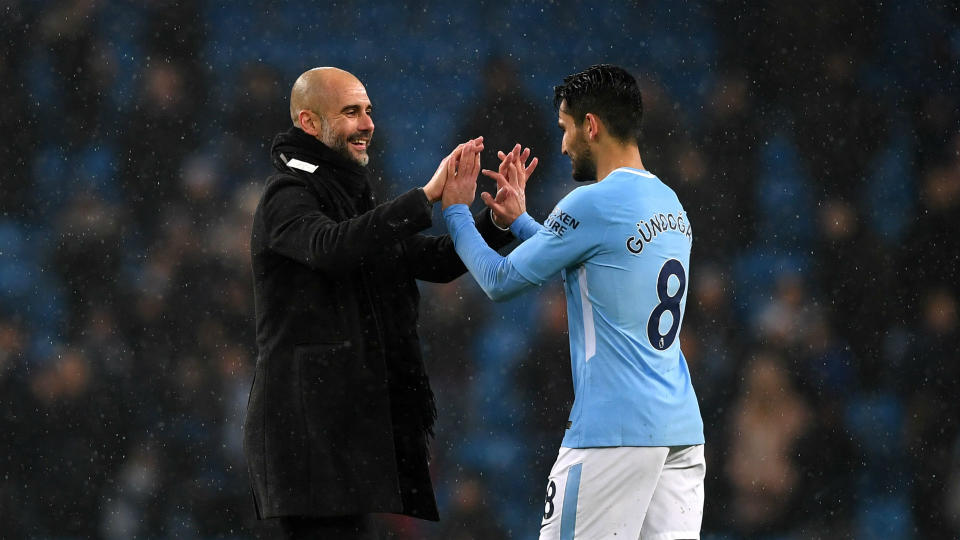How Mourinho uses press conferences differently to Guardiola and Pochettino - and why it won't help Man United players

Well in my opinion, not at all, and the reality is that we, the media, and the general public, tend to either exaggerate or overestimate the effect press conferences actually have on the eventual outcome of any given sports event.
If we want to look at the undoubted King of the Presser, the unrivalled maestro of media manipulation we need to look at a different sport and towards the real ‘Great One’ (sorry Jose) Muhammed Ali. Just before his comeback fight with Joe Frazier back in 1971 he announced, “Frazier’s got two chances. Slim, and none. And Slim just left town”
Smoking Joe knocked Ali down in the last round and won easily on points.
On the plus side of course, Madison Square Garden was packed to the gunnels, available tickets for what was dubbed as the Fight of the Century were as rare as rocking horse droppings, and most of the world woke up at four o’clock in the morning to listen to the event on the radio.
READ MORE: Did Morata banish the ghost of Fernando Torres?
READ MORE: Gossip – Man Utd ‘stunned’ by Mourinho rant
But nothing, absolutely nothing, that happened during the fight, occurred because of anything that had been said in any of the numerous press conferences that preceded it.
Ditto football. They are overrated, over hyped, a neatly packaged product for journos in need of an angle or a headline. The reality of the situation is different; I can’t think of a single press conference that has had a significant bearing on what followed on the field of play.
Much is made of the Kevin Keegan outburst that occurred while Newcastle United were busy imploding as they contrived to squander a 12 point lead in pursuit of the 1995-96 Premier League they had led from August 19 to March 23.
We all ‘luvved it..really luvved it’ when Kevin Keegan seemingly lost the plot after having been successfully wound up like a coiled spring by the canny Sir Alex Ferguson who during Newcastle’s title run in had hinted that Leeds tried harder against a club like Manchester United than they would against someone like Newcastle.
If it was meant to wind up Leeds, to spur them on in didn’t work, because Newcastle won the game 1-0 anyway.
To this day there are people that will claim that it was Keegan’s rant against Sir Alex that destabilised the dressing room that had previously been totally motivated by the ebullient and constantly effervescent Keegan. Nonsense!

The truth had nothing to do with a press conference, a comment, a rant, or reaction to it, or whatever. What it did have to do with was a Manchester United that won 13 of their final 15 matches, and a Newcastle side that managed just 17 points out of a possible final 30 available, including defeat at Anfield in a match where they scored three away goals, led twice, and still contrived to lost 4-3.
What press conferences frequently are however – and Mourinho is a repeat offender in this department – are convenient vehicles to present the ‘case for the defence’.
So, when you are, apparently, the most famous, wealthiest club in the world and yet somehow manage to get bundled out of the biggest club football competition on the planet by, Sevilla, a team who just five days later come off second best against Leganes, a mid-table side who are geographically to Madrid, what Croydon probably is to London, then you are going to be more than keen to put your point of view.
Not once, but twice. The first time to tell the world in a 12-minute rant of just what you have achieved and the second time to blame some of your players – again – for not doing as they were told.
We’ve been here before. It was former Chelsea player, Claude Makelele in his autobiography who hit out at Mourinho for claiming that Chelsea’s success were due to his astute tactics.

He wrote: “To him, individuals didn’t make the team work well, his methods did. At the end Mourinho gave the impression that he felt threatened as soon as a player was in the spotlight more than him.”
So there we have it. Victory is due to him and establishes him as the master tactician. As for defeat – it’s the players fault.
English football is about characters, personalities and controversies and where you find all of those in spades, is in the press conferences; and from the very beginning, even before he joined Chelsea and his self-appointment as the ‘Special One’, Mourinho has known it.
Sir Alex Ferguson was also always a past master of the press conference not because he felt that he thought he could influence what would happen on the pitch by what he said in front of the media but simply because he wanted to constantly be the one setting the agenda.
It wasn’t so much about influencing the players or the game but more people like the fans and even the board and the media itself.
And he did it by creating an uncomfortable atmosphere. I attended many press conferences with Ferguson and all I ever saw was someone in total control of the situation in much the same way as he was in control of those players under his command.
When the media dared to suggest that Juan Sebastian Veron was not perhaps as great a player as had been suggested, his reply was pure Ferguson: “On you go. I’m no f***ing talking to you. He’s a f***ing great player. Yous are f***ing idiots.”
It wasn’t mentioned again.
And then when he realised that the times had changed, that things had moved on, he decided the time had come for him to bow out gracefully.

He did at least on one occasion get his comeuppance though. Once when labelling Arsene Wenger’s side as undeserving league and cup champions: “They are scrappers who rely on belligerence – we are the better team”. Wenger replied, “Everyone thinks they have the prettiest wife at home.”
Today – and Sir Alex well and truly saw it coming – managers have gone from having total control of the club to losing authority in favour of the players. The balance of power in football is changing and it is never more evident than when attending press conference.
There are now two or three more things more important than whatever message the managers may want to impart. Even more important than the work they do.
Money rules. It is not what you say but the wages you pay that will more often than not dictate how well you do in the league.
We live in a much more technical world; a world where there is much more data available, a much greater emphasis on physical and psychological coaches, a world where managers, by and large, have become little more than mere spokesmen of large entities, big teams. They can, though, try to divert attention from the harsh realities that they find yourself confronted with. And this, in a nutshell, is precisely what Mourinho has done.
For most managers, press conferences are a chore, a contractual obligation, a price that has to be paid for receipt of the ‘king’s shilling’.
Someone like Mauricio Pochettino makes them as dull as possible, doing everything he can not to give away any controversial tag lines or comments that he know will make headlines.
If he does come out with anything it is always planned, measured and targeted and during one presser his statement that he was looking to his young players to demonstrate that passion and commitment they would show when playing as kids in the park has been sent to numerous junior sides by way of a motivational argument.
Pep Guardiola once used a press conference to describe Mourinho as ‘el puto amo’ the ‘f****ing guvnor’ of the press conferences following all manner of accusations both public and private that he felt that the club needed to address.

His own players applauded him afterwards and it probably came as a bit of a release for his pupils who had suffered more than enough at the hands of Mourinho’s constant bitching, moaning and sniping particularly about what he considered to be a pro bias stance taken by referees towards Barcelona.
READ MORE: Five things we learned from the Premier League weekend
Barcelona went on to win that first leg of the semi-finals of the Champions League, but did it really influence the outcome of the fixture? Probably not. Nor in fact did Mourinho’s constant Barcelona bias comments influence the referee, in this case the German Wolfgang Stark, who gave Pepe a red card for a studs up challenge on the knee of Dani Alves and with it the chance for Jose Mourinho to once again continue with his persecution narrative.
Rafa Benitez also tried going down the road of using the press conference to get his point over during the 2008-09 season at what he considered to be unnecessary influence exerted on the game by Ferguson.
But did what became known as ‘Rafa’s rant’ have any effect either positive or negative on Liverpool’s form after it. Although they drew the next three games Liverpool would only lose one more league game from then on until the end of the season -they won ten of their last eleven games that campaign, including a 4-1 victory at Old Trafford.
Ferguson’s reaction meantime was a little more stoic and indicative of the Scotsman’s capacity for the use of understatement when required: “I think he was an angry man. He must have been disturbed for some reason.”
You don’t say, Sir Alex!


